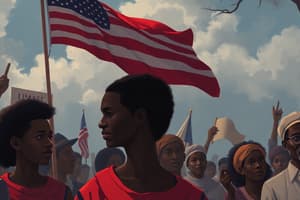Podcast
Questions and Answers
Which event inspired the Civil Rights Movement to utilize nonviolent direct action and civil disobedience?
Which event inspired the Civil Rights Movement to utilize nonviolent direct action and civil disobedience?
- Great Migration
- India's independence movement (correct)
- World War II
- Harlem Renaissance
Who among the following leaders was known for advocating a more aggressive approach to achieving civil rights?
Who among the following leaders was known for advocating a more aggressive approach to achieving civil rights?
- John Lewis
- Malcolm X (correct)
- Martin Luther King Jr.
- Rosa Parks
Which organization was founded by Martin Luther King Jr. to advance the Civil Rights Movement?
Which organization was founded by Martin Luther King Jr. to advance the Civil Rights Movement?
- Congress of Racial Equality (CORE)
- National Association for the Advancement of Colored People (NAACP)
- Southern Christian Leadership Conference (SCLC) (correct)
- Student Nonviolent Coordinating Committee (SNCC)
What were some of the forms of peaceful resistance utilized during the Civil Rights Movement?
What were some of the forms of peaceful resistance utilized during the Civil Rights Movement?
Which historical event directly preceded the emergence of the Civil Rights Movement after World War II?
Which historical event directly preceded the emergence of the Civil Rights Movement after World War II?
Which individual from the list was not directly involved in founding organizations that played key roles in organizing civil rights activities?
Which individual from the list was not directly involved in founding organizations that played key roles in organizing civil rights activities?
What was the Supreme Court's ruling in 1954 regarding racial segregation in public schools?
What was the Supreme Court's ruling in 1954 regarding racial segregation in public schools?
What event led to the year-long Montgomery bus boycott?
What event led to the year-long Montgomery bus boycott?
Which legislation aimed at ending legalized segregation by prohibiting discrimination in employment and public places?
Which legislation aimed at ending legalized segregation by prohibiting discrimination in employment and public places?
What was the main objective of the Freedom Riders during the Civil Rights Movement?
What was the main objective of the Freedom Riders during the Civil Rights Movement?
What did Dr. King emphasize during his 'I Have a Dream' speech at the March on Washington?
What did Dr. King emphasize during his 'I Have a Dream' speech at the March on Washington?
What did the Voting Rights Act of 1965 aim to address?
What did the Voting Rights Act of 1965 aim to address?
Flashcards are hidden until you start studying
Study Notes
A Momentous Journey: The Civil Rights Movement
The Civil Rights Movement was a pivotal time in American history when citizens fought relentlessly against segregation, disenfranchisement, and discrimination based on race. This decades-long struggle profoundly shaped our nation's culture, laws, and ideals. Let's delve into this critical period through its foundations, key figures, turning points, and lasting impacts.
Foundations of the Movement
Rooted in struggles dating back centuries, the Civil Rights Movement emerged after World War II when returning veterans demanded equal rights and respect. It built upon earlier movements like the Harlem Renaissance and the Great Migration while utilizing new strategies such as nonviolent direct action and civil disobedience inspired by Gandhi's approach during India's independence movement.
Leaders and Organizations
Prominent leaders like Martin Luther King Jr., Rosa Parks, Malcolm X, Medgar Evers, and John Lewis served as catalysts for change. They founded organizations such as the Southern Christian Leadership Conference (SCLC) and Student Nonviolent Coordinating Committee (SNCC), which played integral roles in organizing marches, boycotts, sit-ins, freedom rides, and other forms of peaceful resistance across the South.
Key Events
A series of landmark events punctuated the Civil Rights Movement. These included:
- Brown v. Board of Education: In 1954, the Supreme Court ruled racial segregation in public schools unconstitutional, inspiring hope among African Americans for equality and opportunity throughout all aspects of society.
- Montgomery Bus Boycott: Led by Dr. King, the year-long Montgomery bus boycott began following Rosa Parks' arrest for refusing to give up her seat on a city bus. It brought national attention to the cause and elevated King as a prominent leader.
- Freedom Riders: Interracial groups traveled together on buses through the South to challenge segregated facilities. Their violent encounters with white supremacists were documented, galvanizing support throughout the country.
- March on Washington: Over 250,000 people gathered in August 1963 to hear Dr. King deliver his iconic 'I Have a Dream' speech proposing unity and equality for Black Americans.
Legislative Breakthroughs
As the Civil Rights Movement gained momentum, Congress passed several historic pieces of legislation aimed at ending legalized segregation and discrimination. Among these milestones were:
- Voting Rights Act: Signed into law in 1965, it banned discriminatory voting practices that had prevented many Black Americans from exercising their right to vote.
- Civil Rights Act: Passed in 1964, this act prohibited segregation in public places and employment discrimination, making significant strides towards ensuring fairness regardless of race.
Lasting Impacts
Although progress did not occur overnight, the Civil Rights Movement ultimately transformed America. Today, we reap the benefits of an integrated society where individuals have more opportunities to succeed based on merit rather than skin color. However, ongoing challenges remind us that there is still work to do, demonstrating how essential it remains to honor this chapter in history—and learn from it.
Studying That Suits You
Use AI to generate personalized quizzes and flashcards to suit your learning preferences.




